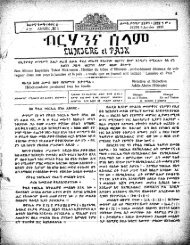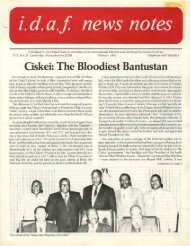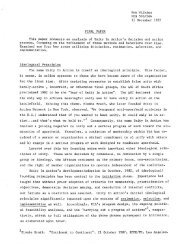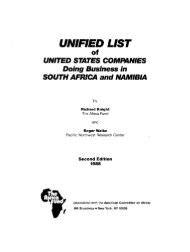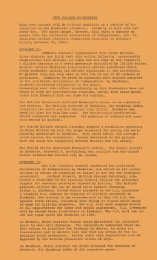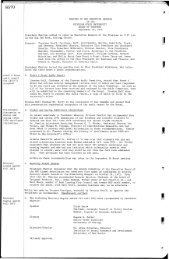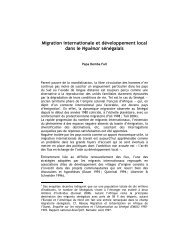the churches and southern africa - KORA
the churches and southern africa - KORA
the churches and southern africa - KORA
You also want an ePaper? Increase the reach of your titles
YUMPU automatically turns print PDFs into web optimized ePapers that Google loves.
eginning to focus on <strong>the</strong> need for improvement of<br />
working conditions for nonwhites. We cannot expect<br />
change to come quickly or easily. Our hope is that it will<br />
come peacefully."<br />
Newsom <strong>and</strong> <strong>the</strong> Administration attempted to guide<br />
this change which <strong>the</strong>y willed to perceive; thus <strong>the</strong>y sent<br />
important official <strong>and</strong> unofficial American representatives<br />
to <strong>the</strong> Cape, such as Frank Shakespeare, head of USIA,<br />
<strong>and</strong> Kevin Phillips, author <strong>and</strong> former special assistant to<br />
Attorney General Mitchell, both in <strong>the</strong> summer of 1971.<br />
But "progress" at a snail's pace seems to be quite<br />
acceptable <strong>and</strong> Ambassador Hurd was never censured for<br />
holding a whites-only function at <strong>the</strong> Embassy residence<br />
in June, 1970. By very close votes which could have been<br />
swayed by White House intervention, Congress upheld<br />
South Africa's sugar quota in 1971, amounting to an<br />
annual subsidy of $4 to $5 million. The Export-Import<br />
Bank agreed in January of this year, for <strong>the</strong> first time<br />
since 1964, to guarantee a major South African<br />
transaction: a $48.6 million loan for <strong>the</strong> sale of GM diesel<br />
locomotives to an aqency of <strong>the</strong> South African<br />
Government.<br />
More serious still, <strong>the</strong> Administration failed to<br />
comment on <strong>the</strong> British rupture of <strong>the</strong> arms embargo in<br />
February 1971 <strong>and</strong> itself began to license <strong>the</strong> sale of light<br />
commercial aircraft-still banned from trade with<br />
China-to <strong>the</strong> South African Government in <strong>the</strong> same<br />
year. This was how <strong>the</strong> licensing was viewed in<br />
Johannesburg:<br />
"The South African Defense Force can now buy light<br />
American aircraft for reconnaissance <strong>and</strong> training<br />
purposes with <strong>the</strong> sanction of <strong>the</strong> U.S. Government,<br />
according to Mrs. Olive Beech, head of <strong>the</strong> American<br />
Beechcraft Corporation.... Mrs. Beech said that her<br />
company, which is one of <strong>the</strong> big three among American<br />
light civil aircraft manufacturers, had recently been given<br />
Government permission to sell to <strong>the</strong> South African<br />
Defense Force if <strong>the</strong> South African Government wants to<br />
buy any of <strong>the</strong>ir aircraft. 'Our Government uses our<br />
aircraft for military purposes such as training,<br />
reconnaissance <strong>and</strong> ambulance work,' said Mrs. Beech.<br />
'And we would be glad to furnish <strong>the</strong> South<br />
African Defense Force.' The Americans for years<br />
operated an arms embargo against South Africa." (Star,<br />
Johannesburg, April 17, 1971)<br />
State Department spokesmen continue to insist that no<br />
planes will be supplied for military purposes-but it is<br />
widely recognized that planes supplied for one purpose<br />
can easily be converted to o<strong>the</strong>r uses. It is precisely such<br />
"light commercial aircraft"-<strong>the</strong> Pipers, Beechcraft, <strong>and</strong><br />
Cessnas-which act as <strong>the</strong> crucial forward air controllers in<br />
Viet Nam, locating crucial targets <strong>and</strong> calling in <strong>the</strong><br />
firepower.<br />
As a final epitaph on American "dialogue" with South<br />
Africa, <strong>the</strong> U.S. Army has been testing <strong>the</strong> Cactus,-a<br />
ground-to-air missile developed by Pretoria with French<br />
assistance, <strong>and</strong> North American Rockwell Corporation has<br />
signed an agreement to produce <strong>the</strong> weapon in<br />
anticipation of an Army decision to adopt it. (Star,<br />
Johannesubrg, July 15, 1972) And South Africa is not<br />
insensitive to <strong>the</strong> advantages of <strong>the</strong> new situation: "Since<br />
President Nixon came to office, American policies have<br />
been reviewed <strong>and</strong> rationalized to <strong>the</strong> extent that<br />
observers believe Mr. Botha [Ambassador to Washington]<br />
will find opportunities to better relations that did not<br />
exist when he was last <strong>the</strong>re." (Star, Johannesburg, May<br />
15, 1972)<br />
As to Nixon policy <strong>and</strong> practice on Namibia, U.N.<br />
Ambassador Yost's announcement in May, 1970 9f an<br />
intention to discourage officially investment in that area<br />
has never been implemented <strong>and</strong> <strong>the</strong> United States has<br />
failed even to accept membership on <strong>the</strong> U.N. Council on<br />
Namibia.<br />
On Rhodesia, <strong>the</strong> Administration quietly broke<br />
sanctions in 1970 by allowing Union Carbide to import<br />
chrome <strong>and</strong> <strong>the</strong>n refused to support its declared potition<br />
for continued economic sanctions, <strong>the</strong>reby allowing <strong>the</strong><br />
Byrd Amendment to pass in October 1971 <strong>and</strong> to be<br />
reaffirmed in May of this year., Last November <strong>the</strong><br />
General Assembly voted a bruising censure of <strong>the</strong><br />
Congressional action; <strong>the</strong> only two votes against <strong>the</strong><br />
motion were those of Portugal <strong>and</strong> South Africa, <strong>the</strong> only<br />
o<strong>the</strong>r open violators. The following day President Nixon<br />
insensitively signed <strong>the</strong> amended military procurement<br />
bill into law. In January, ra<strong>the</strong>r than use its option to<br />
delete chrome <strong>and</strong> o<strong>the</strong>r potential Rhodesian imports<br />
from <strong>the</strong> list of strategic materials, <strong>the</strong> Administration<br />
had <strong>the</strong> Treasury Department issue a license permitting<br />
<strong>the</strong> importation of chrome, nickle, asbestor, graphite,<br />
copper, <strong>and</strong> nine o<strong>the</strong>r Rhodesian products. (Star,<br />
Johannesburg, Jan. 29, 1972; The Washindton Post,<br />
March 19, 1972; Africa Confidential, July 14, 1972)<br />
But <strong>the</strong> most serious application of Option Two, <strong>and</strong><br />
<strong>the</strong> action which has outraged African opinion more than<br />
any o<strong>the</strong>r, has to do with Portugal. The Nixon<br />
Administration prepared <strong>the</strong> ground by authorizing <strong>the</strong><br />
sale of Boeing 707s, 727s, <strong>and</strong> 747s to <strong>the</strong> Lisbon<br />
government <strong>and</strong> <strong>the</strong> state-owned airlines-planes now used<br />
in <strong>the</strong> transport of troops to <strong>and</strong> from Africa-<strong>and</strong> of Bell<br />
Helicopters for use in Mozambique. (Agence France<br />
Presse, Jan. 12, 1971; The Daily Telegraph, Jan. 13,<br />
1971) In 1970 American exports of herb-cides to Portugal<br />
quadrupled, precisely when Lisbon began to use<br />
defoliants against <strong>the</strong> liberation movements in Angola.<br />
The State Department refused to comment about whe<strong>the</strong>r<br />
<strong>the</strong> U.S. products were being used by <strong>the</strong> Portuguese<br />
Army. (NARMIC, Weapons for Counter-Insurgency;<br />
U.S. Exports-Foreign Trade FT 410, November 1970)<br />
The crowning achievement was <strong>the</strong> Azores Agreement.<br />
On December 10, 1971, in conjunction with <strong>the</strong><br />
Nixon-Pompidou encounter in <strong>the</strong> Azores, <strong>the</strong> State<br />
Department announced an "executive agreement"<br />
whereby Portugal extended for two years American use of<br />
<strong>the</strong> air base <strong>and</strong> naval facility in <strong>the</strong> isl<strong>and</strong>s, stations not<br />
considered "vital" even by Washington military opinion.<br />
In return, <strong>the</strong> U.S. made $436.5 million in credits<br />
available to Portugal, including $400 million of loans <strong>and</strong><br />
guarantees through <strong>the</strong> Export-Import Bank, <strong>and</strong> $36.5<br />
million in commodities, "non-military excess equipment,"<br />
education, <strong>and</strong> o<strong>the</strong>r items. The $400 million is eight<br />
times what Portugal received from <strong>the</strong> bank during <strong>the</strong><br />
entire 1946 to 1970 period <strong>and</strong> more than all <strong>the</strong> bank's<br />
loans to <strong>the</strong> entire continent of Africa since 1946.<br />
Congressman Diggs' evaluating this accord in a speech<br />
before <strong>the</strong> Senate Foreign Relations Committee on<br />
Feb. 3, 1972, said: "The Administration is claiming that<br />
<strong>the</strong> Azores Agreement has no political implications for<br />
<strong>the</strong> United States..., <strong>and</strong> that this bears 'no relationship<br />
to <strong>the</strong> Portuguese territories in Africa.' In fact, of course,<br />
<strong>the</strong>re is a very serious political commitment to Portugal<br />
implied in this treaty." The Congressman cited a number<br />
of reasons for his conclusion, including <strong>the</strong> fact that<br />
"Secretary of State Rogers' letter of Dec. 9 to <strong>the</strong>



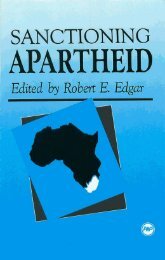
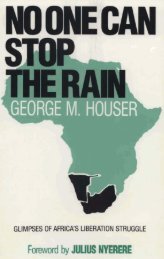

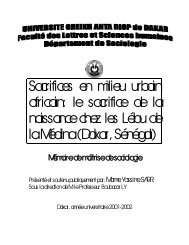
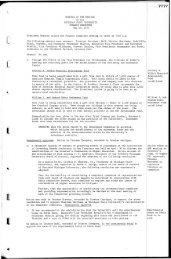
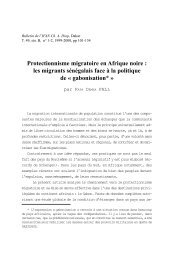
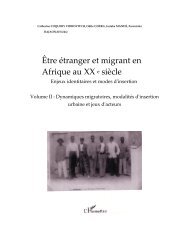
![Synthèse [6] DEFALL..INSTRAW.pdf - Matrix](https://img.yumpu.com/17880734/1/190x245/synthese-6-defallinstrawpdf-matrix.jpg?quality=85)
